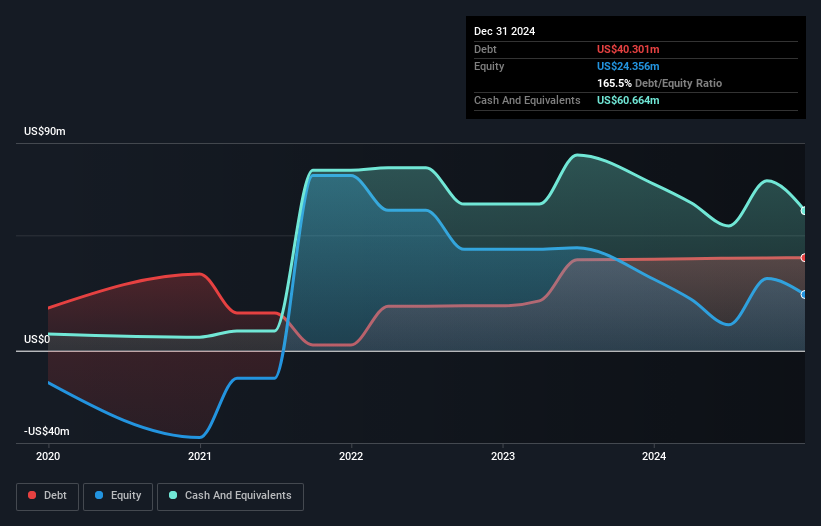- Australia
- /
- Medical Equipment
- /
- ASX:EBR
EBR Systems (ASX:EBR) Has Debt But No Earnings; Should You Worry?

David Iben put it well when he said, 'Volatility is not a risk we care about. What we care about is avoiding the permanent loss of capital.' So it seems the smart money knows that debt - which is usually involved in bankruptcies - is a very important factor, when you assess how risky a company is. Importantly, EBR Systems, Inc. (ASX:EBR) does carry debt. But the real question is whether this debt is making the company risky.
Why Does Debt Bring Risk?
Debt is a tool to help businesses grow, but if a business is incapable of paying off its lenders, then it exists at their mercy. Ultimately, if the company can't fulfill its legal obligations to repay debt, shareholders could walk away with nothing. However, a more frequent (but still costly) occurrence is where a company must issue shares at bargain-basement prices, permanently diluting shareholders, just to shore up its balance sheet. Having said that, the most common situation is where a company manages its debt reasonably well - and to its own advantage. When we examine debt levels, we first consider both cash and debt levels, together.
What Is EBR Systems's Net Debt?
The chart below, which you can click on for greater detail, shows that EBR Systems had US$40.3m in debt in December 2024; about the same as the year before. However, its balance sheet shows it holds US$60.7m in cash, so it actually has US$20.4m net cash.

How Strong Is EBR Systems' Balance Sheet?
Zooming in on the latest balance sheet data, we can see that EBR Systems had liabilities of US$8.33m due within 12 months and liabilities of US$40.9m due beyond that. On the other hand, it had cash of US$60.7m and US$441.4k worth of receivables due within a year. So it can boast US$11.9m more liquid assets than total liabilities.
This surplus suggests that EBR Systems has a conservative balance sheet, and could probably eliminate its debt without much difficulty. Simply put, the fact that EBR Systems has more cash than debt is arguably a good indication that it can manage its debt safely. There's no doubt that we learn most about debt from the balance sheet. But ultimately the future profitability of the business will decide if EBR Systems can strengthen its balance sheet over time. So if you're focused on the future you can check out this free report showing analyst profit forecasts.
View our latest analysis for EBR Systems
Given its lack of meaningful operating revenue, EBR Systems shareholders no doubt hope it can fund itself until it can sell some of its new medical technology.
So How Risky Is EBR Systems?
Statistically speaking companies that lose money are riskier than those that make money. And in the last year EBR Systems had an earnings before interest and tax (EBIT) loss, truth be told. And over the same period it saw negative free cash outflow of US$42m and booked a US$41m accounting loss. But at least it has US$20.4m on the balance sheet to spend on growth, near-term. Even though its balance sheet seems sufficiently liquid, debt always makes us a little nervous if a company doesn't produce free cash flow regularly. There's no doubt that we learn most about debt from the balance sheet. However, not all investment risk resides within the balance sheet - far from it. For example EBR Systems has 4 warning signs (and 2 which are significant) we think you should know about.
At the end of the day, it's often better to focus on companies that are free from net debt. You can access our special list of such companies (all with a track record of profit growth). It's free.
Valuation is complex, but we're here to simplify it.
Discover if EBR Systems might be undervalued or overvalued with our detailed analysis, featuring fair value estimates, potential risks, dividends, insider trades, and its financial condition.
Access Free AnalysisHave feedback on this article? Concerned about the content? Get in touch with us directly. Alternatively, email editorial-team (at) simplywallst.com.
This article by Simply Wall St is general in nature. We provide commentary based on historical data and analyst forecasts only using an unbiased methodology and our articles are not intended to be financial advice. It does not constitute a recommendation to buy or sell any stock, and does not take account of your objectives, or your financial situation. We aim to bring you long-term focused analysis driven by fundamental data. Note that our analysis may not factor in the latest price-sensitive company announcements or qualitative material. Simply Wall St has no position in any stocks mentioned.
About ASX:EBR
EBR Systems
Develops implantable systems for wireless tissue stimulation.
Excellent balance sheet slight.
Market Insights
Community Narratives





